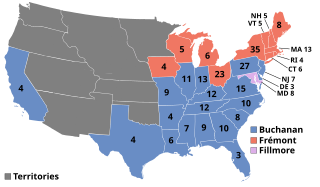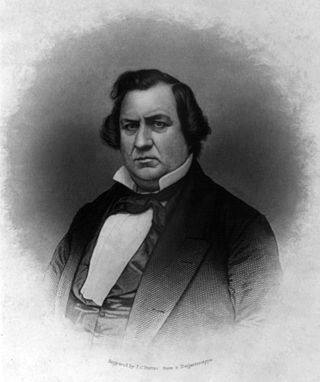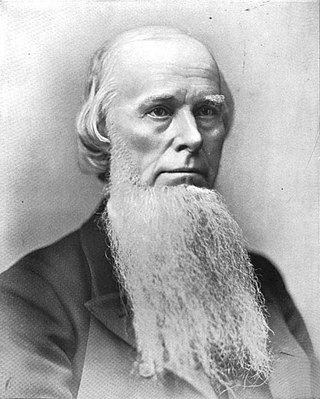
Andrew Johnson was the 17th president of the United States, serving from 1865 to 1869. He assumed the presidency following the assassination of Abraham Lincoln, as he was vice president at that time. Johnson was a Southern Democrat who ran with Abraham Lincoln on the National Union Party ticket, coming to office as the Civil War concluded. He favored quick restoration of the seceded states to the Union without protection for the newly freed people who were formerly enslaved as well as pardoning ex-Confederates. This led to conflict with the Republican-dominated Congress, culminating in his impeachment by the House of Representatives in 1868. He was acquitted in the Senate by one vote.

Presidential elections were held in the United States on November 2, 1852. Democratic nominee Franklin Pierce defeated Whig nominee General Winfield Scott.

Presidential elections were held in the United States on November 4, 1856. Democratic nominee James Buchanan defeated Republican nominee John C. Frémont and Know Nothing/Whig nominee Millard Fillmore. The main issue was the expansion of slavery as facilitated by the Kansas–Nebraska Act of 1854. Buchanan defeated President Franklin Pierce at the 1856 Democratic National Convention for the nomination. Pierce had become widely unpopular in the North because of his support for the pro-slavery faction in the ongoing civil war in territorial Kansas, and Buchanan, a former Secretary of State, had avoided the divisive debates over the Kansas–Nebraska Act by being in Europe as the Ambassador to the United Kingdom.

John Bell was an American politician, attorney, and planter who was a candidate for President of the United States in the election of 1860.

Isham Green Harris was an American and Confederate politician who served as the 16th governor of Tennessee from 1857 to 1862, and as a U.S. senator from 1877 until his death. He was the state's first governor from West Tennessee. A pivotal figure in the state's history, Harris was considered by his contemporaries the person most responsible for leading Tennessee out of the Union and aligning it with the Confederacy during the Civil War.

Alfred Alexander Taylor was an American politician and lecturer from eastern Tennessee. He served as the 34th governor of Tennessee from 1921 to 1923, one of three Republicans to hold the position from the end of Reconstruction to the latter half of the 20th century. He also served three terms in the U.S. House of Representatives, from 1889 to 1895.

The Tennessee Democratic Party (TNDP) is the affiliate of the Democratic Party in Tennessee. The party was founded in 1826 initially as the Jacksonian Party. The Tennessee Democratic Party was born out of President Andrew Jackson's populist philosophy of Jacksonian democracy in the mid to late-1820s. After Jackson left office, the Democratic Party struggled in the state as the Whig Party would go on to be the dominant party in Tennessee until its collapse after the 1852 Election. Prior to the Civil War, as a result of the collapse of the former Whig Party, the Democratic Party became the dominant party in the state. After the war ended, the Republican Party would be the dominant political party during Reconstruction, but once Reconstruction ended, the Democratic Party would dominate Tennessee Politics up until 2011 when the Republican Party would gain firm control of Tennessee State Government.
The Vermont Republican Party is the affiliate of the Republican Party in Vermont and has been active since its foundation in the 1860s. The party is the second largest in the state behind the Vermont Democratic Party, but ahead of the Vermont Progressive Party. The party historically dominated Vermont politics until the mid-20th century, but was replaced by the Vermont Democratic Party. The party currently has very weak federal electoral power in the state, controlling none of Vermont's federal elected offices. The two statewide offices that the party currently controls are the governorship, held by Phil Scott, and the lieutenant governorship, held by John S. Rodgers.

The American Party, known as the Native American Party before 1855 and colloquially referred to as the Know Nothings, or the Know Nothing Party, was an Old Stock nativist political movement in the United States in the 1850s. Members of the movement were required to say "I know nothing" whenever they were asked about its specifics by outsiders, providing the group with its colloquial name.
Since the Great Depression, Rhode Island politics have been dominated by the Rhode Island Democratic Party, and the state is considered part of the Democrats' "Blue Wall." Democrats have won all but four presidential elections since 1928, with the exceptions being 1952, 1956, 1972, and 1984. The Rhode Island Republican Party, although virtually non-existent in the Rhode Island General Assembly, has remained competitive in gubernatorial elections, having won one as recently as 2006. Until 2014, Democrats had not won a gubernatorial election in the state since 1992, and it was not until 2018 that they won one by double digits. The Rhode Island General Assembly has continuously been under Democratic control since 1959.

The 1852–53 United States Senate elections were held on various dates in various states, coinciding with the 1852 presidential election. As these U.S. Senate elections were prior to the ratification of the Seventeenth Amendment in 1913, senators were chosen by state legislatures. Senators were elected over a wide range of time throughout 1852 and 1853, and a seat may have been filled months late or remained vacant due to legislative deadlock. In these elections, terms were up for the senators in Class 2.

John Netherland was an American attorney and politician, active primarily in mid-19th century Tennessee. A leader of the state's Whigs, he served in both the Tennessee Senate and Tennessee House of Representatives, and was an unsuccessful candidate for governor on the Opposition ticket in 1859. During the Civil War, he supported the Union, and was a delegate to the 1861 East Tennessee Convention.

On January 15, 1867, Simon Cameron was elected to the United States Senate by the Pennsylvania General Assembly for the third time; it had previously chosen him in 1845 and 1857. The legislature voted for Cameron over the incumbent, Senator Edgar Cowan, who, though a Republican, was endorsed by the Democratic legislative caucus. With the Republican Party holding a large majority in the legislature, the main battle was for its endorsement: the caucus of Republican legislators had voted for Cameron over Governor Andrew Curtin.
William H. Wisener was an American politician, active primarily at the state level in Tennessee during the mid-19th century. He served four terms in the Tennessee House of Representatives, including one term as Speaker (1853–1855). A Southern Unionist, he led the opposition to secession in the House on the eve of the Civil War. After the war, he served in the Tennessee Senate, where he introduced the 13th Amendment for ratification in April 1865.

The 1859 California gubernatorial election was held on September 7, 1859, to elect the governor of California.

The 1854 Massachusetts gubernatorial election was held on November 15. American Party candidate Henry J. Gardner was elected to his first term as governor, defeating incumbent Whig governor Emory Washburn.

The 1851–52 Massachusetts gubernatorial election consisted of an initial popular vote held on November 10, 1851, followed by a legislative vote conducted on January 12, 1852. Incumbent Democrat Governor George S. Boutwell was reelected to a second term in office. The ultimate task of electing the governor had been placed before the Massachusetts General Court because no candidate received the majority of the vote required for a candidate to be elected through the popular election.

The 1855 Georgia gubernatorial election was held on 1 October 1855 in order to elect the Governor of Georgia. Democratic nominee and incumbent Governor Herschel V. Johnson was re-elected against Know Nothing (Sam) nominee Garnett Andrews and Temperance nominee B. H. Overby.

The 1859 Tennessee gubernatorial election was held on August 4, 1859, to elect the governor of Tennessee. Incumbent Democratic governor Isham G. Harris narrowly won re-election, defeating Opposition Party John Netherland with 52.79% of the vote.

The 1857 Georgia gubernatorial election was held on October 5, 1857, in order to elect the Governor of Georgia. Democratic nominee and state circuit court judge Joseph E. Brown defeated Know Nothing (Sam) nominee and State legislator Benjamin Harvey Hill.




















